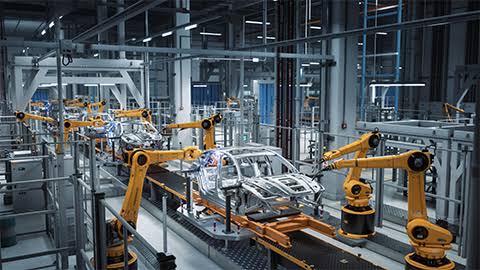Control integrators play a crucial role across industries, providing tailored solutions to enhance operational efficiency and ensure safe, streamlined processes. From managing complex chemical reactions to ensuring energy efficiency, these integrators bring specialized expertise to various fields. Each type of control integrator serves a unique purpose, equipped with specific skills and tools to meet the demanding requirements of their respective industries. Let’s dive into the types of control integrators and their specialties, showcasing how they drive innovation and optimize performance across sectors.
Precision Process Control for Chemical and Pharmaceutical Applications
In the high-stakes world of chemical and pharmaceutical manufacturing, precision process control is essential. Control integrators specializing in these industries bring a unique focus on managing intricate chemical reactions and tightly regulated production environments. These integrators design systems that control temperature, pressure, and other critical variables to meet stringent quality and safety standards. By ensuring that each step of the process is meticulously managed, these systems help companies maintain compliance and produce consistent, high-quality products.
In pharmaceuticals, even the smallest variations can have significant impacts on product efficacy and safety. Control integrators understand these nuances and incorporate advanced automation solutions, such as programmable logic controllers (PLCs) and distributed control systems (DCS), to streamline operations. With their expertise, they support companies in delivering safe, reliable products, safeguarding both the company’s reputation and consumer health.
Environmental Control Systems for HVAC and Cleanroom Standards
Environmental control system integrators are the backbone of HVAC and cleanroom environments, ensuring spaces meet strict air quality and cleanliness standards. In sectors like healthcare, electronics, and research laboratories, control integrators play a vital role in maintaining cleanroom environments with precise humidity, temperature, and particle control. They specialize in designing and implementing systems that create controlled, sterile spaces where even the smallest particles can be detrimental.
These integrators often work closely with HVAC specialists to integrate intelligent air filtration, ventilation, and monitoring systems, allowing for real-time adjustments. With the increasing focus on energy efficiency, environmental control integrators also incorporate green technologies, like variable-speed drives and smart sensors, to minimize energy usage without compromising environmental standards. Their work supports critical applications, ensuring safe, controlled environments for sensitive processes and products.
Read Also: How SumoSearch Is Revolutionizing Search Engines
Motion and Robotics Control for High-Speed Manufacturing
In fast-paced manufacturing environments, motion and robotics control integrators bring unmatched expertise in high-speed, precision automation. These specialists develop systems that coordinate the movements of robotic arms, conveyors, and other machinery essential for high-speed production. Control integrators in this field use advanced motion control solutions to synchronize equipment, reduce bottlenecks, and increase throughput.
Robotics control integrators bring experience in programming and integrating automation software to optimize workflows, which reduces downtime and ensures consistent quality. By developing systems that meet the demands of high-speed production, these integrators allow manufacturers to boost productivity and maintain quality, giving companies a competitive edge. Their contribution to automation is invaluable in fields like automotive, electronics, and consumer goods, where precision and efficiency are paramount.
Safety and Compliance Integration in Hazardous Industries
In industries like oil and gas, mining, and petrochemicals, safety and compliance are critical due to the high-risk environments. Control integrators focusing on safety and compliance are experts at designing systems that monitor, detect, and respond to potential hazards. They integrate specialized sensors, alarm systems, and emergency shut-off mechanisms to create a safe operating environment.
These integrators work to ensure that companies adhere to industry regulations and standards, minimizing risk to both workers and the environment. By implementing fail-safes and automated shutdown procedures, they help prevent accidents and reduce the likelihood of costly fines. Their systems not only protect lives but also provide peace of mind for companies operating in hazardous sectors, allowing them to focus on productivity while prioritizing safety.
Energy Management Controls Tailored for Utilities and Renewables
Energy management control integrators bring a sustainable focus, designing systems that monitor and optimize energy usage across utilities and renewable energy sectors. These integrators specialize in smart grid technology, energy storage solutions, and renewable energy integration to support efficient, reliable energy delivery. By controlling power distribution and monitoring usage in real-time, they help utility companies maintain balance and avoid costly energy losses.
For renewable energy projects, control integrators incorporate advanced software and hardware to manage variable energy inputs from sources like solar and wind. Their expertise allows utilities and companies to maximize renewable energy use, reducing their environmental impact and promoting sustainable practices. These integrators are key players in the shift toward greener energy solutions, making significant contributions to energy efficiency and sustainability goals worldwide.
Custom Automation Solutions for Food and Beverage Processing
Control integrators specializing in food and beverage processing create custom automation solutions that ensure product quality, safety, and compliance with health standards. These integrators design systems that manage everything from ingredient mixing to packaging, often using automated conveyors, inspection systems, and temperature controls to maintain consistency and safety throughout production.
With the growing demand for traceability and food safety, control integrators incorporate solutions that offer detailed monitoring and reporting capabilities. They ensure that each step in the process is meticulously controlled, helping companies meet both regulatory standards and consumer expectations. By reducing human error and enhancing process accuracy, control integrators play a critical role in the food and beverage industry, supporting the delivery of safe, high-quality products to market.


